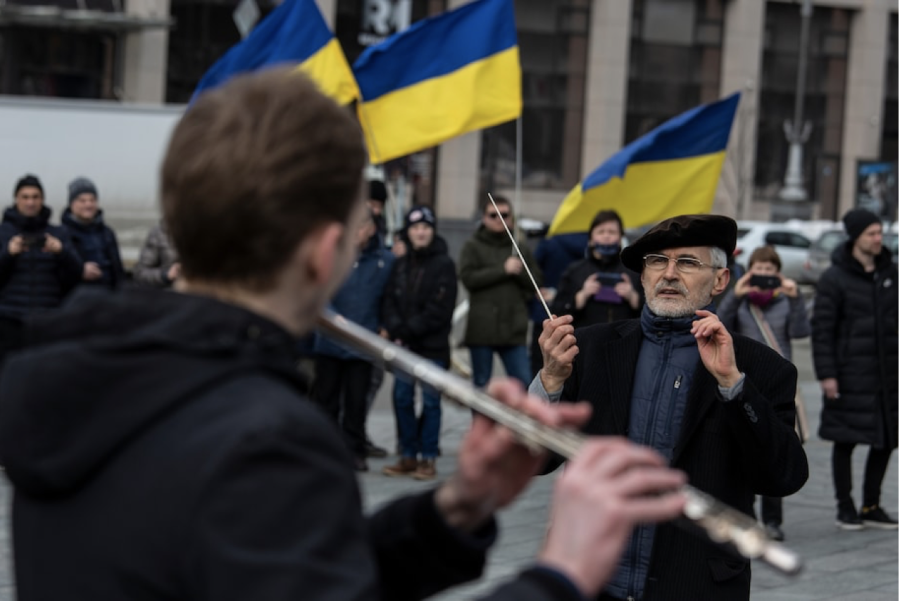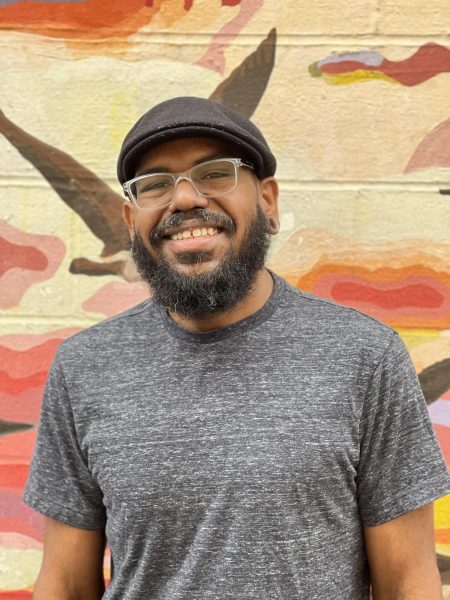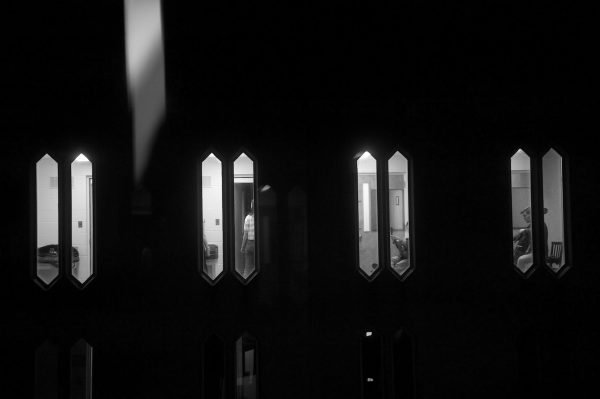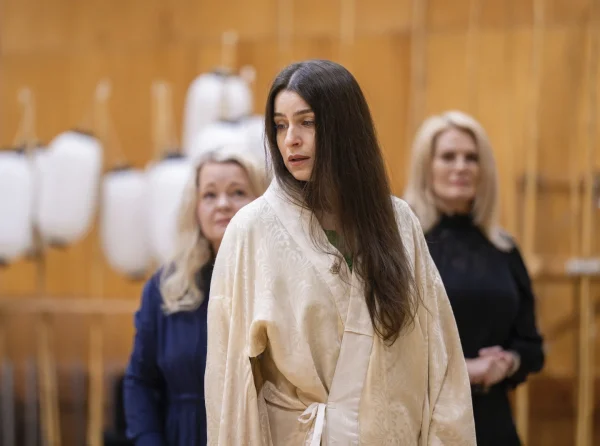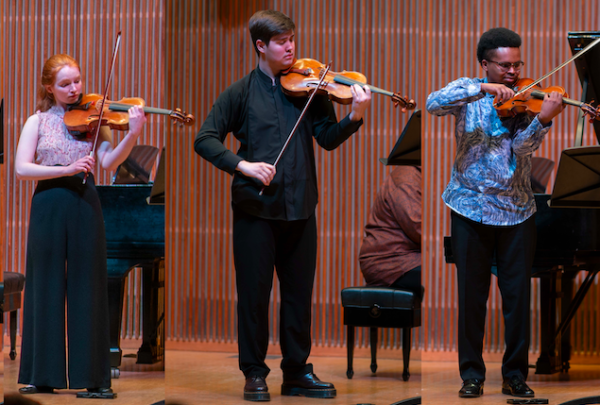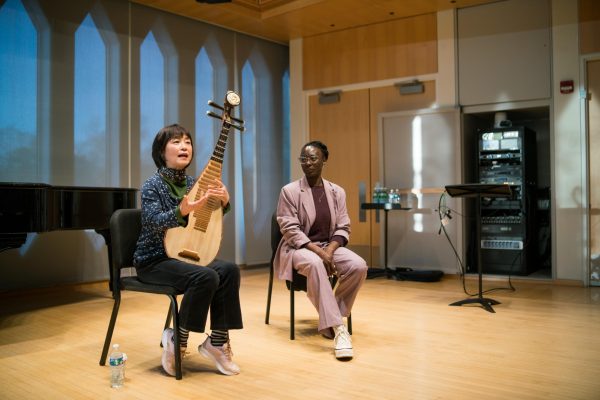Classical Music Used as Power and Resistance During Wartime
Heidi Levine for The Washington Post
Herman Makarenko, Conductor of the Kyiv-Classic Symphony Orchestra, leads a concert in Kyiv’s central square, Maidan.
The year was 1958.
In the midst of the Cold War, 50 pianists from around the world converged on Moscow for a first-of-its-kind event: the International Tchaikovsky Competition.
It was a chance for the Soviet Union to wield a soft-power cultural cudgel — to bolster its national strength, already demonstrated by the previous year’s successful launch of the world’s first artificial satellite, Sputnik I.
Each pianist was required to perform a complete program of music, the focal point being Pyotr Ilyich Tchaikovsky’s Piano Concerto No. 1, a tour de force in bravura, intensity, and passion. Harvey “Van” Cliburn’s calculated yet relentless performance wowed the judges, but before he could be awarded first prize, they had to ask Supreme Leader Nikita Khrushchev if an American, a citizen of the Soviet Union’s greatest Cold War adversary, could receive such an honor.
Khrushchev responded, “Is he the best?” The judges told him yes. “Then give him the prize!”
By winning the International Tchaikovsky Competition, Van Cliburn would become the first and only pianist in American history to receive a ticker-tape parade in Manhattan. His image appeared emblazoned on the cover of TIME magazine with the caption, “The Texan Who Conquered Russia.”
But Cliburn did more than just win this competition. He became a symbol of the power of classical music to transcend geopolitical boundaries when other forms of diplomacy had failed.
Cliburn’s success in the Soviet Union demonstrated the capacity of classical music to bridge cultural and political rifts, particularly between authoritarian and democratic countries.
Yet authoritarian regimes, particularly Russia, not only see classical music as a rich component of culture but also as a tool for spreading state propaganda.
As a genre, classical music poses little threat to the state. Because much of its canon has emerged from a distant past, it appears removed from current political conflicts. Indeed, most of the time, when American pianists play a Beethoven sonata, or when famed Russian conductor Valery Gergiev leads a symphony, they are not envisioning their performance as a political statement, but rather as an expression of the human condition at a moment in time. In an effort to convey artistic authenticity, they look to the past to try to capture how the composer would have imagined the piece being played.
In much of the Western world, classical works are often associated with a nation’s highest cultural achievements, and because of this, the government can exploit the artistic form to celebrate a glorified, mythical past. Sergei Prokofiev’s score to Sergei Eisenstein’s seminal film Alexander Nevsky (1938) was released on the precipice of war in Europe and rallied Russian audiences to fight in defense of the Soviet Union. A nation’s world-renowned classical musicians, meanwhile, reflect universally recognized technical and artistic brilliance which serve as symbols of that nation’s prominence.
This past month, Gergiev and soprano operatist Anna Netrebko, both towering artists who have close contacts with Western musical institutions, including Carnegie Hall and the Metropolitan Opera, have faced almost universal boycotts outside of Russia for their refusal to denounce Russian President Vladimir Putin’s role in the invasion of Ukraine. By ostracizing these artists, the classical music world has raised the immensely fraught issue of whether the politics of the artist should determine if we enjoy their work.
In Gergiev’s case, the ethics of canceling him are more understandable — he is a close friend of Putin’s and has a history of using his work to support Russia’s international aggression.
In 2008, for example, Gergiev performed Dmitri Shostakovich’s famous Leningrad symphony — a work composed during Germany’s years-long siege of Leningrad in World War II — in the separatist region of South Ossetia in Georgia, implicitly comparing the international condemnation of Russian military aggression to the Nazi attack on the Soviet Union. In 2016, Gergiev performed a concert in the ruins of Palmyra, Syria, an area that the Russian government — as part of a ruthless bombing campaign — helped Dictator Bashar al-Assad’s forces retake during the Syrian Civil War.
The case for canceling Netrebko’s performances, however, is less straightforward. While she had previously voiced her support for Russian aggression in Crimea, she denounced the current war in Ukraine, albeit refusing to call out Putin’s responsibility, while vociferously rejecting the idea that artists should be expected to make political statements.
A few days later, General Manager of the Metropolitan Opera Peter Gelb released a statement declaring, “We can no longer engage with artists or institutions that support Putin or are supported by him.”
Yet in Russia, where the long claw of the authoritarian regime reaches deeply into the lives of citizens, especially those in the world of classical music, what precisely does Gelb mean by musicians who “support Putin or are supported by [Putin]?”
At the current moment, as the world recoils in horror at Putin’s war against Ukraine, the classical music community is again forced to confront uncomfortable questions. How do we acknowledge the role that classical art forms have played in bolstering authoritarian power? Does the work of the artist transcend their political beliefs? And, perhaps most importantly, how do we as artists trained in a classical tradition use our craft to protest the brutality of an authoritarian-turned-totalitarian regime, hold those who support it accountable, and honor the humanity of those who suffer needlessly from it?
This Wednesday, as the Washington Post reported, the Ukrainian National Tchaikovsky Academy of Music in Kyiv — named after the same composer who inspired the International Tchaikovsky Competition and saw the Ukrainian capital as a second home — decided, in the midst of the shelling, explosions, and devastation from Russia’s military assault, to perform a program of Ukrainian classical music and Beethoven’s “Ode to Joy” in Maidan, Kyiv’s central square.
According to the senior adviser to the Academy’s president, Louri Loutsenko, “We are showing our strength through music.”


